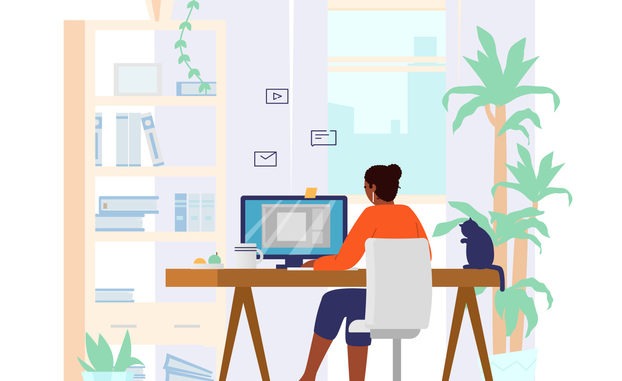
Hybrid working is set to be a major business trend in the second half of this year, and dealers can help employers ensure they have the right equipment for this.
The COVID-19 pandemic changed the way many people work, with home working increasingly significant. These changes look set to stay as we move towards a post-pandemic phase, with many people wanting to work at home for at least some of the time.
Figures from the Office for National Statistics show that of those currently working from home, 85% want to use a ‘hybrid’ approach of both home and office working in future. This means that hybrid working is set to become increasingly common and presents opportunities to dealers.
For instance, while mobile ‘phones, webcams and high-speed internet connections continue to offer seamless communication between home and base, access to information is a concern. “Employees are looking for solutions to have business continuity between work and home, through shared online access to documents and paperwork,” says Andrew Cowling, senior channel marketing specialist at PFU (EMEA) Ltd – a Fujitsu company.
“Paper-based information can be stored in filing cabinets, desks, storage boxes and archives, which makes it difficult to share and access. Moving documents between home and work also increases the risk of loss, damage or theft, increasing the risk of data loss and potential of fines.
“Scanning these documents unlocks their potential, allowing the digital information to be shared on mobile devices, tablets and PCs – enabling access whenever, and wherever they are required. This also offers the combined benefits of being able to organise, analyse, search and share information, quickly and easily, saving time and money whilst improving efficiency for customers. Dealers can educate customers on scanning benefits in order to help open up this market opportunity.”
Video solutions
Jeff May, UK sales director at conferencing specialist Konftel, agrees that dealers have an important role in educating customers on the flexible solutions available to enable hybrid working. “New opportunities will continue to be created as businesses take a more balanced and agile approach. Diversity is key for dealers; one size doesn’t fit all,” he says.
“We will see over the next six-to-12 months major growth in hybrid video solutions, suitable for boardrooms and huddle rooms, and also dedicated home working environments, where users demand the highest quality audio and video experience. COVID has shown that some people want to work permanently from home, while others prefer the office while many want a mixture of both.
“Hardware and software that ticks all the boxes across all three categories will accelerate – based on technology that’s easy to install and easy to use, wherever people are working. More video meetings will take place across more room environments.”
Jeff adds that business travel is likely to take up to three years to reach pre-COVID levels, as video and audio-conferencing sales continue to accelerate.
Taking tablets
Jade Clifford, of eco-eco Stationery, believes that devices such as tablets can help to increase efficiency in a hybrid set-up, which is an angle dealers could use. “I avoid using the printer by substituting a tablet alongside my laptop; I load up the document needed and make notes using an ePen – this way I can save my document with notes, as needed, and save for others to read/respond to. This reduces needless paper waste as well as making the printer redundant in my WFH setup. My notes are accessible to my colleagues and any physical copies needed are safely stored in my eco-eco Stud Wallet, which is perfect for keeping things sustainable.”
Safe storage
However, hybrid working is not just about the equipment needed; thought has to be given to how it is carried around, as Tim Bonnett, VP sales and marketing at monolith Global GmbH, explains.
“With hybrid working people need to take their offices with them wherever they go,” he says. “There is a whole new customer base as we see it; people who used to work five days a week at their desks never used to take anything home with them, as they never needed to.
“We are seeing demand for all sorts of bags, depending on what they are moving around, whether this is laptops plus paperwork or a tablet. It depends also on whether they are carrying confidential material, which means the bag needs to be lockable.”
Tim points out that there are also health and safety issues that need to be considered. “With wheeled products, weight can be put on the ground and not carried or using backpacks puts the weight across both shoulders, so it is more evenly distributed, which is better for your back.
“This is where dealers need to have a dialogue with the customer, rather than letting them just go online and order for themselves. The dealer can engage with, and influence, the decision and be a point of advice and work with the consumer to find the best solution.
“There has been a lot of discussion about people needing office furniture at home, but there is a wider range of products that people will start to work out they need for their new working practices. This is what we are seeing with the business luggage side – people have, perhaps, been borrowing a bag off the kids to go to and from the office – but that isn’t a long-term solution. Now people are getting their heads around new working practices, and what they need. Employers are asking, from a health and safety perspective, what they need to provide to teams to enable them to work safely, happily, and at their maximum capability.
“We are seeing a range of companies looking for business backpacks, wheeled products and environmental solutions. They all have different criteria but, with our breadth of range, hopefully we can help the dealer community to take advantage of those opportunities.”


Be the first to comment